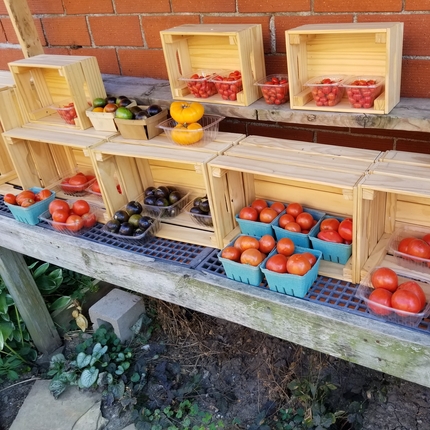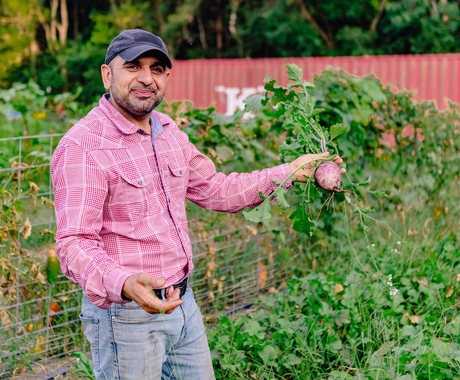Jessie Eby contributed to this blog.
When it comes to earning money in agriculture, the process seems pretty straightforward. Produce and sell, right? For the most part, yes, but your farm has much more to offer than the mere goods it produces. Agritourism is a growing sector of the travel industry that offers visitors the opportunity to immerse themselves in farm, vineyard, orchard, and ranch life. From picking fresh fruits to learning about sustainable farming practices, agritourism is gaining traction among the masses who are craving a more direct connection to their resources and the people who provide them.
The good news: you don’t need to change much to capitalize on agritourism. One great way to dip your toe into the agritourism pond is with a small farm stand or store. Farm stands and stores can play a pivotal role in marketing your farm products and cultivating meaningful relationships between you and your consumers.
Farm stands
A farm stand is a space on your farm designated for selling goods. Not only are these stands a convenient way to sell your products, but they’re also a great way to educate visitors about your farming practices and connect with your customers. Consumers are curious about where their food and goods come from; opening up your farm to them can help build a relationship and encourage future purchases.
Direct marketing
Farm stands cut out the middleman, allowing you to showcase your fresh produce, artisanal goods, and farm-fresh products directly to consumers. This direct interaction builds trust and loyalty, fostering a sense of community around your farm.
Additional revenue
By selling directly to consumers through a farm stand, you can capture the full retail value of your products, maximizing profits. Plus, farm stands offer flexibility—whether it's selling surplus produce, homemade jams, or farm-raised meats, you can diversify your offerings to meet market demand.
Connecting with your audience
Farm stands provide a platform to engage with your customers, share the story behind your products, and educate them about your farming practices. This personal connection fosters customer loyalty and encourages repeat business.
How to set up a farm stand
Traditionally, farm stands are fairly basic and tend to be more rustic than formal brick-and-mortar stores. Because you don’t have to invest a whole lot of time or money into building a stand, you can experiment and figure out what works for you. After you’ve established your farm stand and are seeing some success, you can decide whether you want to invest in a more permanent stand. Here are a few things to consider.
Structure and equipment
You don’t need a formal structure for a farm stand. It could be as simple as a folding table with some basic signage to advertise your goods, or as complex as building an open-style building. This comes down to your preference and how much you want to invest in this part of your business. Starting out, it might be wise to simply set up a trailer with signs or flags and see how it goes. After you begin to see some success, you may decide to build something a little more permanent.
It’s best to keep your payment system simple as you’re beginning. Start with a cash system, and explore the option of accepting cards or electronic payment systems later on down the road. You can even set up an honor system, where you put your items out and leave a cash box for patrons to deposit their payments. This is a great way to run your farm stand without having to dedicate the time to staff it, as long as you feel comfortable.
Challenges
Although setting up a farm stand is fairly simple and low-risk, there are some challenges to be aware of. First, it’s important to check with your insurance to see if you need any additional coverage. It can be dangerous to bring people to your farm, and you want to make sure you’re covered for anything that might happen. People tend to be curious and may wander or take their own “tour” of your property. You’ll want to be prepared for how to handle any sort of situation that may arise including but not limited to theft or vandalism.
Other challenges include the logistics of storing your products properly. Do you need electricity? Do your products require refrigeration? These considerations might influence where you can put your farm stand.
Important considerations
As with any business venture, you’ll need to have a plan before you set up your farm stand. Here are some things to consider.
Budgeting
How much are you willing to spend on your farm stand? It’s important to think realistically about how much you will be able to bring in. Start small and slowly invest in improvements as necessary.
Marketing
Farm stands rely heavily on local consumers. You likely won’t be seeing customers outside of a 30-mile radius. This isn’t a problem, it’s simply something to keep in mind as you market your farm stand. You’re not trying to reach customers from all over; you’re focused on reaching customers in your community and the surrounding area.
You can reach your target audience through social media, local advertising, and word-of-mouth. Share photos of your products, behind-the-scenes glimpses of farm life, and special promotions to attract customers. Customers love to feel connected to the businesses they patronize, and a strong social media presence can help build that bond.
Risk management
As we mentioned earlier, it can be dangerous to bring people to your farm. You’ll want to regularly evaluate how to keep your customers safe. Be forward-thinking. Look around your farm for any potential danger, and figure out how to mitigate it.
Zoning
If you’re setting up your farm stand somewhere other than your own farm, you’ll want to choose a visible, easily accessible location with ample parking. Consider proximity to urban areas, tourist attractions, or popular routes frequented by your target market. Before setting up your farm stand, research local regulations and obtain any necessary permits or licenses. This may include zoning regulations, health department permits for food sales, and roadside stand permits.
Insurance
As always, you’ll want to check with your farm insurance provider to make sure your plans fall within the parameters of your coverage. You may need to increase your coverage or opt for a different package. If you haven’t already done so, you may want to consider putting your farm in an LLC to lower your risk.
Recordkeeping and taxes
It's important to keep your books up to date. Your financial records can help you make strategic decisions for next season, such as which products to carry and which to discontinue. Maintaining accurate records will also help you be prepared for tax season.
Maintaining a farm stand
Regular maintenance will help keep your farm stand running safely for all who visit. It’s important to check your stand every day for safety and functionality before you open. At the end of every day, be sure you’re removing any old products and cleaning any messes.
Collaborating with other producers
If you don’t feel that you have enough products to sustain a farm stand on your own, you may consider inviting other producers to share your farm stand. This can add variety to your stand and help you reach audiences you might not have otherwise, increasing your brand awareness and potentially your revenue. If you do opt to do a collaborative farm stand, you’ll want to have an honest conversation with the other producers regarding expectations, investment (both time and money), and maintenance. It’s important to make sure everyone is on the same page and pitching in equally to make the farm stand a success.
Farm stand vs farm store
If your farm stand is doing really well, you may consider taking it a step further and starting a farm store. A farm store is a more formal setup, typically a brick and mortar with electricity. If you’re considering a farm store, it’s important to think about the cost of investment versus your return. A farm store can be successful, but it’s a larger investment and commitment than a farm stand.
Whether you're a small-scale family farm or a sprawling agricultural enterprise, adding a farm stand can increase your brand awareness, revenue, and reputation. A farm stand is not just a place to sell products; it's an opportunity to build lasting connections with your customers.





